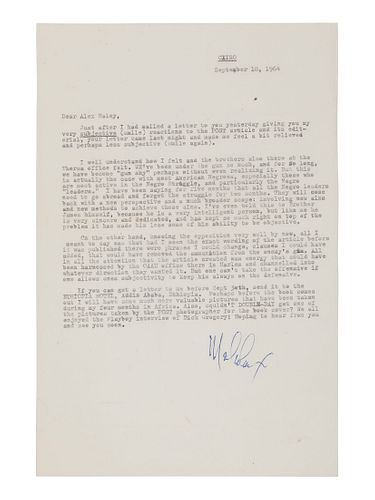MALCOLM X (1925-1965). Typed letter signed ("Malcolm X"), to Alex Haley. Cairo, Egypt, 18 September 1964. " 1 page, 8vo.
Lot 267
About Seller
Hindman
1338 West Lake Street
Chicago, IL 60607
United States
Recognized as the Midwest's leading fine art auctioneers, Hindman Auctioneers has built a worldwide reputation based on a full service approach to the auction business tailored to meet the individual needs of our clients. Coming from a variety of educational backgrounds, specialists bring years of e...Read more
Categories
Estimate:
$6,000 - $8,000
Absentee vs Live bid
Two ways to bid:
- Leave a max absentee bid and the platform will bid on your behalf up to your maximum bid during the live auction.
- Bid live during the auction and your bids will be submitted real-time to the auctioneer.
Bid Increments
| Price | Bid Increment |
|---|---|
| $0 | $25 |
| $500 | $50 |
| $1,000 | $100 |
| $2,000 | $250 |
| $5,000 | $500 |
| $10,000 | $1,000 |
| $20,000 | $2,500 |
| $50,000 | $5,000 |
| $100,000 | $10,000 |
About Auction
By Hindman
Oct 8, 2020
Set Reminder
2020-10-08 11:00:00
2020-10-08 11:00:00
America/New_York
Bidsquare
Bidsquare : Selections from the Library of Gerald and Barbara Weiner
https://www.bidsquare.com/auctions/hindman-auctions/selections-from-the-library-of-gerald-and-barbara-weiner-5544
Hindman Bidsquare@hindmanauctions.com
Hindman Bidsquare@hindmanauctions.com
- Lot Description
MALCOLM X (1925-1965). Typed letter signed ("Malcolm X"), to Alex Haley. Cairo, Egypt, 18 September 1964. " 1 page, 8vo.
A letter written to Alex Haley (1921-1992), part of a series of responses to the editorial, "The Lesson of Malcolm X" published by the Saturday Evening Post on September 12, 1964. Haley describes the initial correspondence in the Epilogue of The Autobiography of Malcolm X: "The Saturday Evening Post flew photographer John Launois to Cairo to locate Malcolm X and photograph him in color. The magazine's September 12 issue appeared, and I sent a copy by airmail to Malcolm X. Within a few days, I received a stinging note, expressing his anger at the magazine's editorial regarding his life story...I wrote to Malcom X that he could not fairly hold me responsible for what the magazine had written in a separate editorial opinion. He wrote an apology, 'but the greatest care must be exercised in the future.'"
Malcolm X opens his response to Haley's apology: "Just after I had mailed a letter to you yesterday giving you my very subjective (smile) reactions to the POST article and its editorial, your letter came last night and made me feel a bit relieved and perhaps less subjective (smile again)."
He continues, describing the exhausting nature of the civil rights struggle and the benefit he sees in stepping back and considering the cause from a global perspective, "WE've [sic] been under the gun so much, and for so long, we have become 'gun shy' perhaps without even realizing it. But this is actually the case with most American Negroes, especially these who are most active in the Negro Struggle, and particularly the Negro 'leaders.' I have been saying for five months that all the Negro leaders need to go abroad and forget the struggle for two months. They will come back with a new perspective and much broader scope: involving new aims and new methods to achieve these aims." 1964 was a tumultuous year for Malcolm X and would prove to be the last full year of his life. He split from the Nation of Islam in early March, converted to Sunni Islam, undertook the Hajj in April, and contended with escalating threats from the Nation of Islam. He would spend much of the year traveling throughout Africa delivering lectures and conferring with prominent figures across the continent. Haley had originally met Malcom X in 1960 and had penned two articles about him and the Nation of Islam. After suggestions from his publisher, Haley proposed the idea of a biography to Malcolm X in 1963. Despite initial hesitation, Malcolm X agreed. In the Epilogue, Haley admits that "we got off to a very poor start. To use a word he liked, I think both of us were a bit 'spooky.'" Over time their relationship thawed, and Haley used the material garnered from over 50 interviews to publish his critically-acclaimed first book, The Autobiography of Malcolm X in October 1965.
For condition inquiries please contact Gretchen Hause at gretchenhause@hindmanauctions.comCondition
- Shipping Info
-
Please refer to https://hindmanauctions.com/shipping-packing
-
- Buyer's Premium



 EUR
EUR CAD
CAD AUD
AUD GBP
GBP MXN
MXN HKD
HKD CNY
CNY MYR
MYR SEK
SEK SGD
SGD CHF
CHF THB
THB












